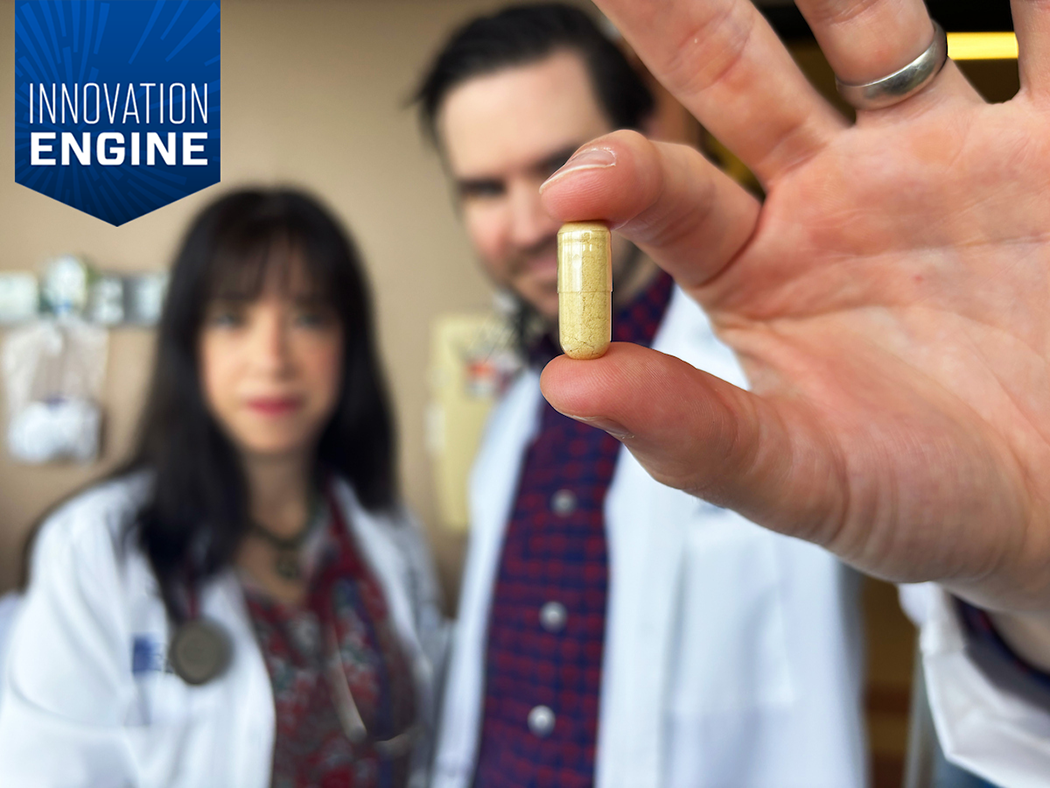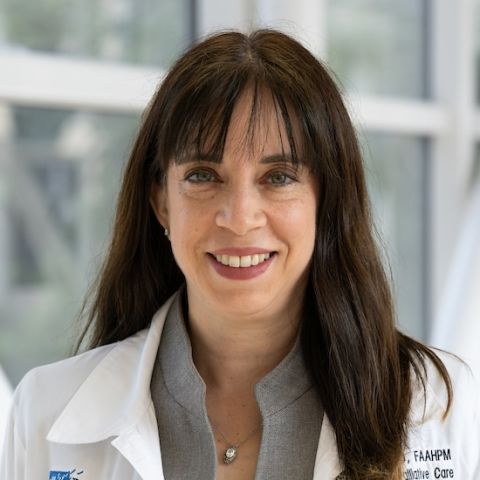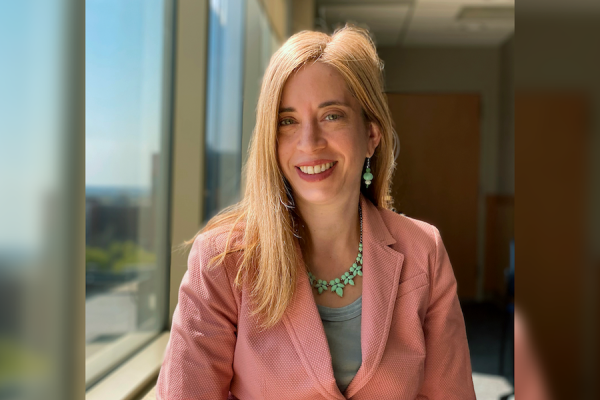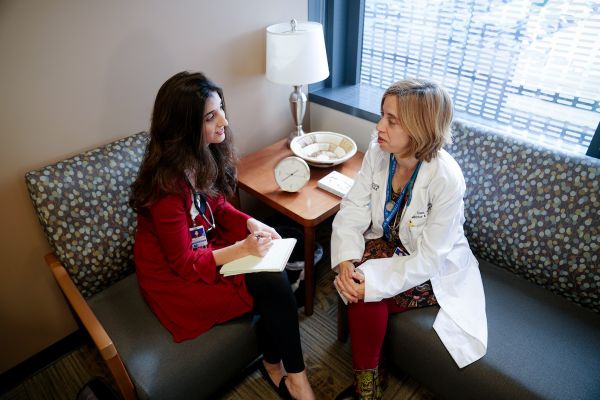Roswell Park’s Palliative Care team explores surprising new ways to tackle both the physical and psychological sources of cancer pain
It’s estimated that about half of all cancer patients experience pain caused by the disease or the side effects of treatment. Relieving that pain can be complicated by the fact that emotional distress and anxiety often accompany a cancer diagnosis.
“You can’t separate the mind and the body,” says Amy Case, MD, FAAHPM, Chief Wellness Officer and Chair of the Department of Supportive and Palliative Care at Roswell Park Comprehensive Cancer Center. “Cancer patients may have pain and also struggle mentally, and the physical pain will be worse because of the mental suffering. The two are linked. That’s why we sometimes use antidepressants to treat pain.”
To find more-effective ways of treating both types of pain at the same time, Dr. Case and William Alexander, MD, PhD, Assistant Professor of Oncology in the Department of Supportive and Palliative Care, are investigating the potential of psychedelic drugs, including psilocybin, a natural compound found in many species of so-called “magic mushrooms.” This fall they will launch a clinical trial — just approved by the FDA and exclusive to Roswell Park — that will gauge its effects on both physical and psychological pain.
What is psilocybin?
Psilocybin has been used for thousands of years by cultures around the world as a medicine or in ancient rituals, but little research has been done in modern times to evaluate its use as a legitimate therapy. “Psychedelic drugs were criminalized in the ’60s,” notes Dr. Case. “There was a lot of bad press and politicizing of the potential harms of these drugs. Groundbreaking research was happening back then regarding their use for depression and anxiety, but it was shut down by the government. Now that research is being approached scientifically.”
Studies suggest that psilocybin may affect pain in three related ways:
- It interacts with a molecule in the brain called serotonin, which is involved in regulating mood and pain perception.
- It acts as an anti-inflammatory to reduce pain caused by inflammation.
- It relieves pain by relieving other aspects of the pain experience, such as anxiety and stress.
Psilocybin is type of drug called a psychedelic, which means “mind or soul manifesting.” It can cause profound changes in emotions and perceptions. “It binds to serotonin receptors, promoting a sense of well-being,” explains Dr. Case. “Often it gives people a feeling of overwhelming love and peace. It can help them see the world differently. They may feel more connected with the universe and other human beings.” Patients who have received high doses of psilocybin in clinical trials for the treatment of anxiety and/or depression have described feeling “unconditional and undying love,” a sense of interconnectedness with everything in the world, and being in a familiar place.
“Psilocybin and other psychedelic drugs have some unique properties that seem to address other dimensions of suffering and pain,” notes Dr. Alexander. He says that despite the lingering ’60s reputation of psychedelic drugs, they do not appear to have strong addictive potential. In current clinical trials where patients are screened and the drug is administered in a controlled setting, psychedelics appear to be relatively safe.
How will Roswell Park study psilocybin?
Most recent studies administer the psychedelic in high doses, which can generate a very intense “journey” that can be profoundly beautiful and meaningful but also has the potential to be challenging. But Dr. Alexander cautions that the high-dose approach may not be best for everyone.“ We’re exploring the use of multiple, much-lower doses that ideally will be minimally hallucinogenic,” he says. “This is called micro-dosing.” He adds that the clinical trial will mark the first time micro-dosing has been used to study how psilocybin affects pain.
“We’ll also be looking at how it affects patients’ anxiety, depression, existential distress and trauma,” he says. “And because the patients we’re enrolling will also be taking prescription opioids for pain, we’ll look at whether there’s a decrease in their opioid requirement over time.”
In addition to psilocybin, patients who enroll in the Roswell Park clinical trial will receive “meaning-based therapy,” designed to help them find meaning in their lives. “Cancer patients experience a lot of distress, and meaning-based therapies are quite effective at alleviating that,” says Dr. Alexander, who completed specialized training in meaning-centered psychotherapy. He also trained for a year to become a psychedelic therapist, and Dr. Case is about to begin a year-long psychedelic-assisted psychotherapy training program as well.
Supportive and Palliative Care
Our Supportive & Palliative Care program provides essential support and symptom management to our patients who are facing difficult symptoms, such as pain, or who may be feeling overwhelmed or don't have the support they need to get through their treatment.
“We have an interdisciplinary team that will be helping us, including physicians, specially trained nurses, social workers, psychologists and our spiritual care team,” says Dr. Case. “We have a group of researchers in Western New York who are very interested in this.”
The Palliative Care team also operates a clinic that administers pain relief with the psychedelic-like drug ketamine, which is a surgical anesthetic approved by the FDA for treatment-resistant depression. “Patients treated with ketamine tend to calm down,” notes Dr. Case. “They go ‘elsewhere’ for a little while and come out of it feeling more relaxed. When you give a patient something that makes them feel peaceful, it does something to the pain receptors in the brain as well. It’s physiological.”
“The study of psychedelics has really taken off in the field of psychiatry,” notes Dr. Alexander. “And now there’s a lot of interest in the palliative care field as well, because it involves existential, spiritual and psychological aspects of pain, and right now we don’t have a lot of great tools for that broad perspective. We hope our research will change that.”





